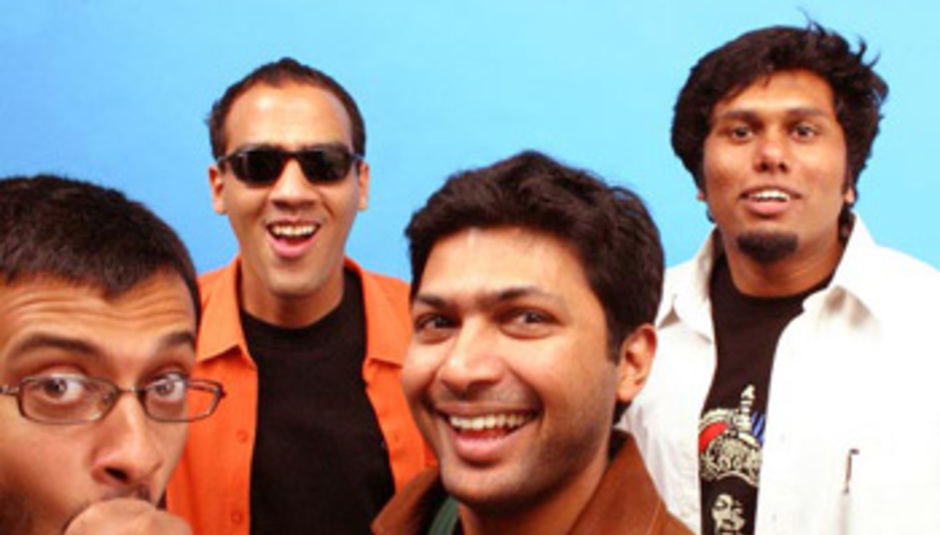Ever since The Beatles popped over to see Maharishi Mahesh Yogi in 1966 (preceding Sgt. Pepper’s Lonely Heart’s Club Band, which appeared the following year), Indian musical culture has had a direct and substantial influence on western pop culture.
The following decade saw the influence continue with songs such as The Rolling Stones' ‘Paint It Black’, The Kinks' ‘Fancy’, and The Byrds' ‘Eight Miles High’, plus half a Led Zeppelin record (or two) and a good dose of The Doors’ back catalogue highlighting the trend. The incorporation of Indian instruments like the sitar was titled ‘raga rock’, with the classical musician Ravi Shankar and others famously aligning themselves with it.
Equally, western music had a strong impact in post-colonial India. Of note was All-India Radio or AIR, the state-owned radio monopoly which had a number of weekly pop music programmes. Other regional stations had a purveying influence as well.
Early beat-influenced groups of note originating from India were the Mystiks from Bombay, the Beat-X from Madras and the Flintstone from Calcutta.
Since then Indian influence has been subsumed into British music and culture so much that it is hardly a notable thing to pick out over the radio waves of Britain. In India, however, the reverse influence is more direct and obvious. Over the past decade or so, rock in both its alternative and heavy forms is becoming more and more prevalent.
Recently, Iron Maiden made an inaugural trip to India to play a huge show to 35,000-plus people in Bangalore, in the south. The Maiden, it must be noted, are still seen as a huge, relevant force in pretty much every country outside of their home in UK (are they not huge here? – Ed). People travelled from around the country and beyond to attend what was the country’s first inaugural Metalfest.
Indeed, the wikipedia.org extract on the subject comes up with this potted history:
“India has continued to produce bands in various styles of rock music, from soft rock and roll and rock pop, to hard rock and metal. With the arrival of MTV, tastes rapidly changed, encouraging bands to harden their style and focus more on underground styles such as death metal, alternative metal, prog rock, etc. The 1990s saw the rise of a much larger following of various harder styles for this reason. Bands that had formed in the ‘80s, such as Rock Machine (who would later be known as Indus Creed), altered their style with the influx of newer techniques and influences from the west. Others formed in the ‘90s with harder styles influenced by the growing split between popular rock (such as Britpop), alternative styles (such as punk), and metal styles (such as thrash) - the last of which many considered to be truer to the roots of rock music, and the legacy of hard rock bands from the ‘70s. The Indian sub-genre of fusion, which encourages a similar blend of ancient Indian musical traditions with rock music to raga rock, was also carried forward, and is perhaps the most unique Indian style of rock.”
In the current decade, Indian rock has a larger following than ever. Despite its marginalisation, in comparison to film music especially, it is a strong and growing underbelly of a country with a population of approximately 1 billion people.
Popular hard-rock and metal bands in the country include Bleed, Xenon and Kinky Ski Munky, but the music is largely divided up geographically due to the size of the nation.
Delhi boasts popular bands in Parikrama (who are now touring Europe with Iron Maiden), Indian Ocean and Orange Street.
Bangalore boasts Thermal And A Quarter (probably India’s most critically acclaimed act, pictured), Bhoomi, Myndsnare, Synaps, Whitenoiz, Ministry Of Blues, Extinct Reflections, as well as the aforementioned Bleed.
India also has a wide range of music events; as well as the new Metalfest, Freedom Jam is conducted every year on the 14th of August every year in honour of the Indian Independence Day, alongside Sunday Jam, which is conducted on the first Sunday of every month; both are seen as a key event for bands looking for a break. Delhi currently claims to be India’s rock capital with local bands winning the last three Campus Rock Idol tours – the nation’s biggest amateur rock competition. Delhi also mainly hosts The Great Indian Rock Festival.
With such a large emerging country embracing modern rock music, many are suggesting that India will be the next key nation in guitar music.
For more information and resources, check www.gigpad.com. Eternal thanks to wikipedia.org!
















